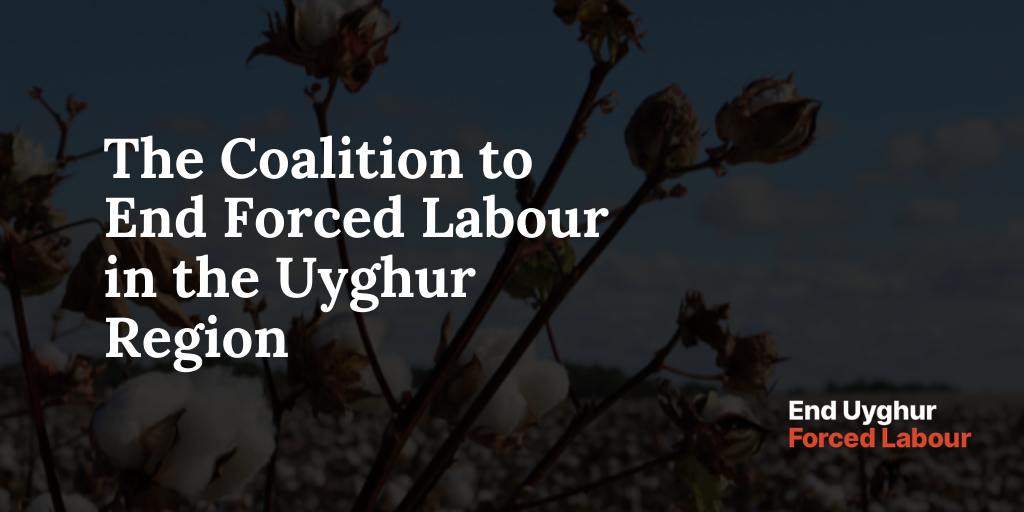Coalition Calls on Construction Industry to Cut Ties to Uyghur Forced Labour, Given Explosive New Evidence

June 14, 2022
Following today’s publication of a new report revealing the deep permeation of Uyghur forced labour in the global supply chain of polyvinyl chloride (PVC) plastics, the Coalition to End Forced Labour in the Uyghur Region called on corporations in the construction industry to stop sourcing any materials from the Xinjiang Uyghur Autonomous Region of China. The report, published by the Helena Kennedy Centre for International Justice at Sheffield Hallam University and Material Research L3C, found that the two largest PVC manufacturers in China are state-owned enterprises based in the Uyghur Region, where abuses against Uyghurs and other Turkic and Muslim majority peoples, including mass detention and forced labour, are well-documented.
“The building materials industry has grown increasingly reliant on PVC manufactured in the Uyghur Region over the last two years. At this point, most of the major American retailers of flooring are at high risk of selling products made by forced labour. This is a wake up call – not only to the building sector but to all sectors – that full supply chain visibility is critical,” said Laura T. Murphy of Sheffield Hallam University, one of the authors of the report.
PVC, one of the world’s most widely produced synthetic polymers of plastics, is used as a base material for a variety of products, most commonly in the production of luxury flooring and pipes. The report finds that PVC plastics manufactured in the Uyghur Region account for nearly a fifth of all of China’s PVC, and 10% of the world’s supply, making building materials the latest industry to come under fire for widespread complicity in crimes against humanity in the Region. Other notable high-violation industries include apparel and solar: up to 20% of all cotton-based products and up to 97% of all polysilicon-based solar panels worldwide are estimated to be tainted with Uyghur forced labour.
According to the researchers, the two largest PVC manufacturers in China, Xinjiang Zhongtai Chemical and Xinjiang Tianye, are also active participants in the Chinese government’s notorious ‘labour transfer’ programme. The Coalition is deeply troubled by the report’s findings regarding Zhongtai Group, which the researchers document has transferred over 5,000 citizens deemed ‘surplus labourers’ – perhaps more than any other company in the Region.
Researchers have documented that transferred labourers are forcibly moved from their hometowns and required to take state-assigned work. Despite significant mechanisation, the report states that Zhongtai continues to make use of ‘transferred labour’ in the production of PVC and their other products. The report finds that the methods used to manufacture these materials in the Uyghur Region are incredibly hazardous, releasing an estimated 9.3 tons of mercury into the air every year.
“Industries that source materials from the Uyghur Region must acknowledge the reality that they are at a high risk of relying on forced labour to create their profits,” said Elfidar Iltebir, President of the Uyghur American Association. “This data has to be a wake-up call to corporations working with PVC. With countries increasingly looking at bans on supplies made with forced labour, these companies must clean up quickly or risk falling behind the law. The only responsible decision they can make is to cut ties with Uyghur Region manufacturing entirely.”
Some countries, like the U.S., have implemented legislation regulating the import of products from the Uyghur Region, while key markets like Europe will be considering instruments to ban the importation of forced labour products. Given the tight surveillance in the Region and Chinese authorities’ campaign to silence and intimidate victims, it is impossible to conduct effective labour rights due diligence in the Region, so the only way businesses can be sure their products are not being made with Uyghur forced labour is to exit these supply chains entirely.
In response to today’s report, the Coalition raised an urgent call for corporations relying on PVC from the Uyghur Region to immediately cut ties with PVC manufacturers operating in the Region, both to avoid the risk of complicity in Chinese authorities’ human rights abuses, and to ensure they are prepared to comply with international regulations.
Photo credit: Pam Broviak
Find out more about the Coalition to End Forced Labour in the Uyghur Region.
